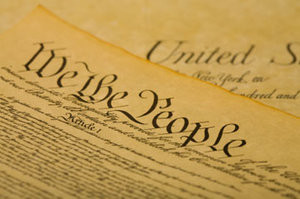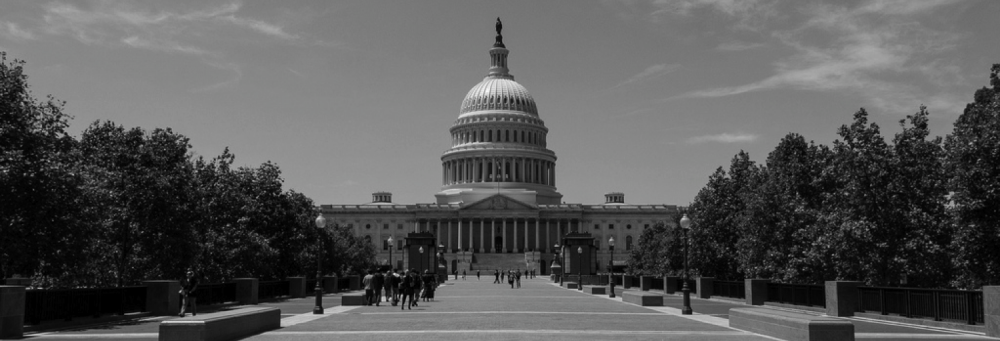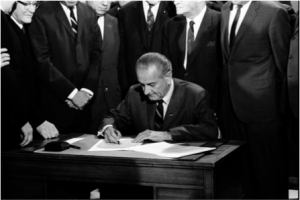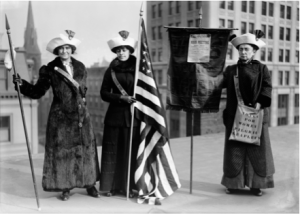 The United States are a constitutional republic, an indirect democracy. The Constitution and the Bill of Rights, the legal basis the United States are founded upon, are widely considered to be brilliant documents and the men who conceived them are universally admired and beloved. Their defiant act of fighting the revolutionary war against the British Empire for the United States’ independence and the republic they established to contrast the British monarchy are a major source of pride for the nation. Democracy is the essence of the American identity – but it is an identity that seems to have been lost.
The United States are a constitutional republic, an indirect democracy. The Constitution and the Bill of Rights, the legal basis the United States are founded upon, are widely considered to be brilliant documents and the men who conceived them are universally admired and beloved. Their defiant act of fighting the revolutionary war against the British Empire for the United States’ independence and the republic they established to contrast the British monarchy are a major source of pride for the nation. Democracy is the essence of the American identity – but it is an identity that seems to have been lost.
American democracy was never without challenges. Voting rights were initially limited exclusively to white landowners and it took until the Voting Rights Act of 1965 for American elections to be fully representative of its populace including minorities and women. Elections were throughout history subject to fraud including the presidential elections of 1876 confirming Rutherford Hayes and the 2000 election that awarded the presidency to George W. Bush. The American model of democracy by design allows for candidates to win the presidency without winning the popular vote. The most prominent example once more being the 2000 election which saw Al Gore winning the popular vote by half a million votes, yet losing in the electoral college.
Despite the historical flaws of the system, in the last 100 years hardly anyone would have argued that the United States are not a democracy. But the American system of governance increasingly shows signs of incremental decay as a concerted effort is undertaken to roll back the century-long progress granting fair and representative elections, the voter’s choices are being limited to a few prescreened elite candidates of two parties and ideas give way to money as the decisive factor in elections.
The 19th Amendment guaranteeing women the right to vote and the Voting Rights Act were both laws designed to improve American democracy by making it more inclusive and therefore representative. In the last 10 years, however, there has been a systematic push to roll back the very progress people fought to achieve for decades. Gerrymandering in states like Ohio, Pennsylvania and Virginia has led to congressional representation bearing little resemblance to the actual voting patterns and clearly favoring one party of the other. Voter ID laws trying to alienate the poor and minorities have been passed in 16 states – ironically under the guise of preventing exploitation of the system. Both measures have been implemented in a narrow-minded effort to favor the Republican party at the expense of the democratic process.
But more damning still is the enormous influx of money in the political process that amounts to nothing less than legalized corruption. Over 6 billion dollars have been spent in the 2012 elections. Barack Obama and Mitt Romney spent 1 billion each in their bid for the presidency. In 2014 Super PACs raised almost 700 billion dollars to support candidates. More than 50% came from only 100 Americans. The competition of ideas, one of the strongest qualities of democracy, is replaced by a competition of money and in the United States of today money wins between 82 to 96 percent of the time. Policies in consequence strongly favor funders’ interests and fostered a dynamic of wealth redistribution in the hands of the very few on the expense of the vast majority Americans.
 Among the electorate the accurate sense is prevailing that the real choices democracy should offer don’t exist. Voter turnout for the 2014 congressional election was the lowest in 70 years with only 36.4% of eligible voters choosing to participate. With two parties dominating the political stage for the last century plurality was already limited. The thorough corruption of Democrats and Republicans alike and the fact that candidates on the state and federal level are almost entirely prescreened by the funders has some people wondering whether the United States at this point are not an oligarchy instead of a democracy. Others argue American democracy has been lost altogether.
Among the electorate the accurate sense is prevailing that the real choices democracy should offer don’t exist. Voter turnout for the 2014 congressional election was the lowest in 70 years with only 36.4% of eligible voters choosing to participate. With two parties dominating the political stage for the last century plurality was already limited. The thorough corruption of Democrats and Republicans alike and the fact that candidates on the state and federal level are almost entirely prescreened by the funders has some people wondering whether the United States at this point are not an oligarchy instead of a democracy. Others argue American democracy has been lost altogether.
Democracy means rule of the people; the majority of people. Today’s America, however, is ruled by money and its extreme concentration in the hands of a very few assures that the overwhelming majority of people have little influence. Elections are held and representatives are elected but put in context American democracy is little more than make-belief. Until the most powerful nation on earth manages to conquer its inner demons and reinvigorates a truly democratic system the United States will bear very little resemblance with the country its people idolize.


